University Research Report: HLTEN514 - Music Therapy and Dementia
VerifiedAdded on 2021/04/21
|8
|1466
|29
Report
AI Summary
This report explores the application of music therapy for dementia patients, addressing key terms, research findings, and practical considerations. It examines the effectiveness of music interventions in alleviating pain and agitation, referencing a meta-analysis by Vasionytė and Madison (2013) and other relevant literature. The report outlines ethical considerations, including privacy, confidentiality, and informed consent, and references the Australian Code for the Responsible Conduct of Research and the Privacy Act 1988. It presents a research timeline, budget, and dissemination plan, emphasizing collaborative teamwork. The assignment covers physical and emotional needs, cultural considerations, and the role of the Human Research Ethics Committee (HRECs). The report also discusses ethical guidelines for staff and the importance of data confidentiality, along with a detailed research timeline, budget, and dissemination strategy focusing on conferences and social media. Finally, it emphasizes the importance of collaborative teamwork and ethical considerations throughout the research process, highlighting the benefits of music therapy for dementia patients.

Running head: hlten514
hlten514
Name of the Student
Name of the University
Author note
hlten514
Name of the Student
Name of the University
Author note
Paraphrase This Document
Need a fresh take? Get an instant paraphrase of this document with our AI Paraphraser
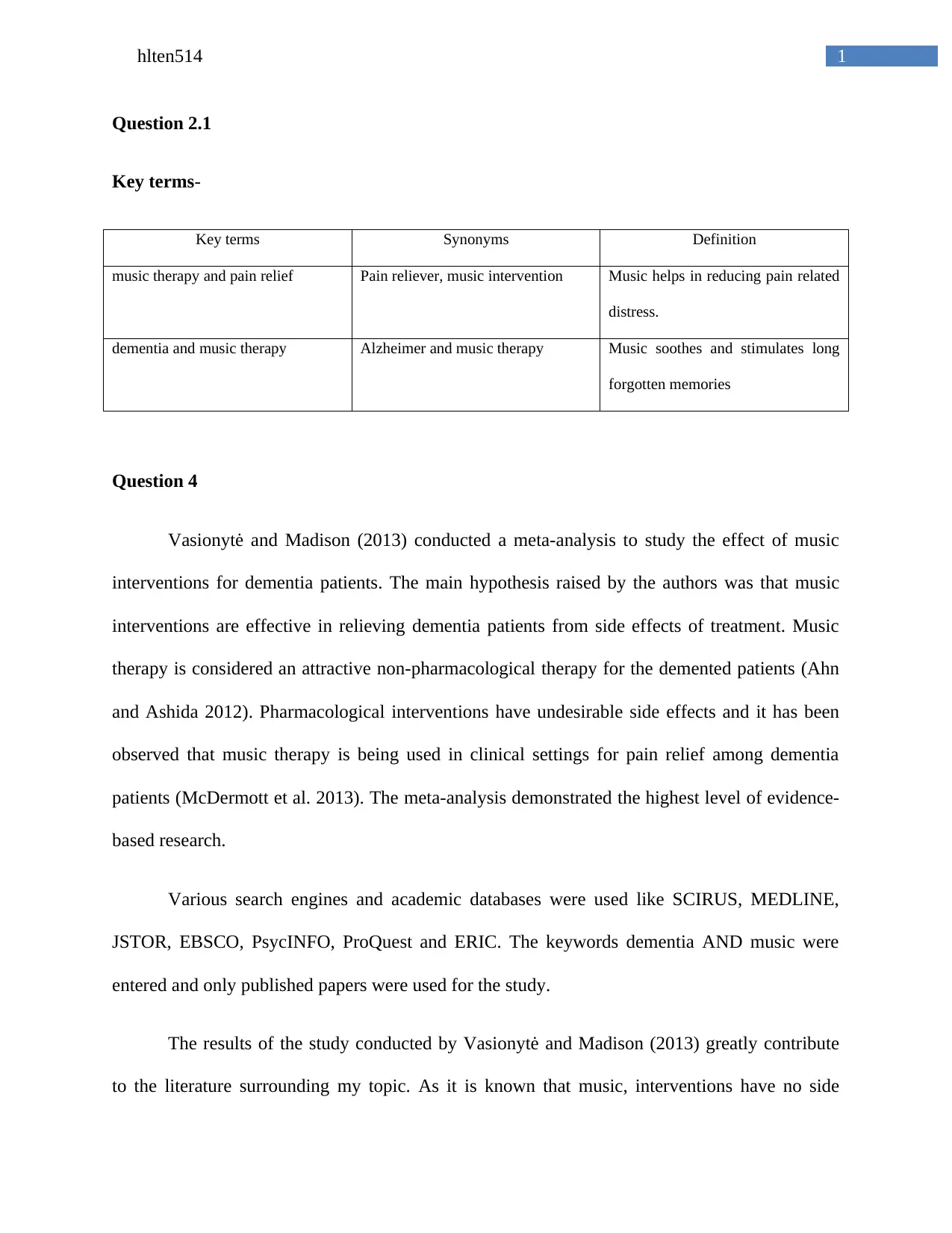
1hlten514
Question 2.1
Key terms-
Key terms Synonyms Definition
music therapy and pain relief Pain reliever, music intervention Music helps in reducing pain related
distress.
dementia and music therapy Alzheimer and music therapy Music soothes and stimulates long
forgotten memories
Question 4
Vasionytė and Madison (2013) conducted a meta-analysis to study the effect of music
interventions for dementia patients. The main hypothesis raised by the authors was that music
interventions are effective in relieving dementia patients from side effects of treatment. Music
therapy is considered an attractive non-pharmacological therapy for the demented patients (Ahn
and Ashida 2012). Pharmacological interventions have undesirable side effects and it has been
observed that music therapy is being used in clinical settings for pain relief among dementia
patients (McDermott et al. 2013). The meta-analysis demonstrated the highest level of evidence-
based research.
Various search engines and academic databases were used like SCIRUS, MEDLINE,
JSTOR, EBSCO, PsycINFO, ProQuest and ERIC. The keywords dementia AND music were
entered and only published papers were used for the study.
The results of the study conducted by Vasionytė and Madison (2013) greatly contribute
to the literature surrounding my topic. As it is known that music, interventions have no side
Question 2.1
Key terms-
Key terms Synonyms Definition
music therapy and pain relief Pain reliever, music intervention Music helps in reducing pain related
distress.
dementia and music therapy Alzheimer and music therapy Music soothes and stimulates long
forgotten memories
Question 4
Vasionytė and Madison (2013) conducted a meta-analysis to study the effect of music
interventions for dementia patients. The main hypothesis raised by the authors was that music
interventions are effective in relieving dementia patients from side effects of treatment. Music
therapy is considered an attractive non-pharmacological therapy for the demented patients (Ahn
and Ashida 2012). Pharmacological interventions have undesirable side effects and it has been
observed that music therapy is being used in clinical settings for pain relief among dementia
patients (McDermott et al. 2013). The meta-analysis demonstrated the highest level of evidence-
based research.
Various search engines and academic databases were used like SCIRUS, MEDLINE,
JSTOR, EBSCO, PsycINFO, ProQuest and ERIC. The keywords dementia AND music were
entered and only published papers were used for the study.
The results of the study conducted by Vasionytė and Madison (2013) greatly contribute
to the literature surrounding my topic. As it is known that music, interventions have no side
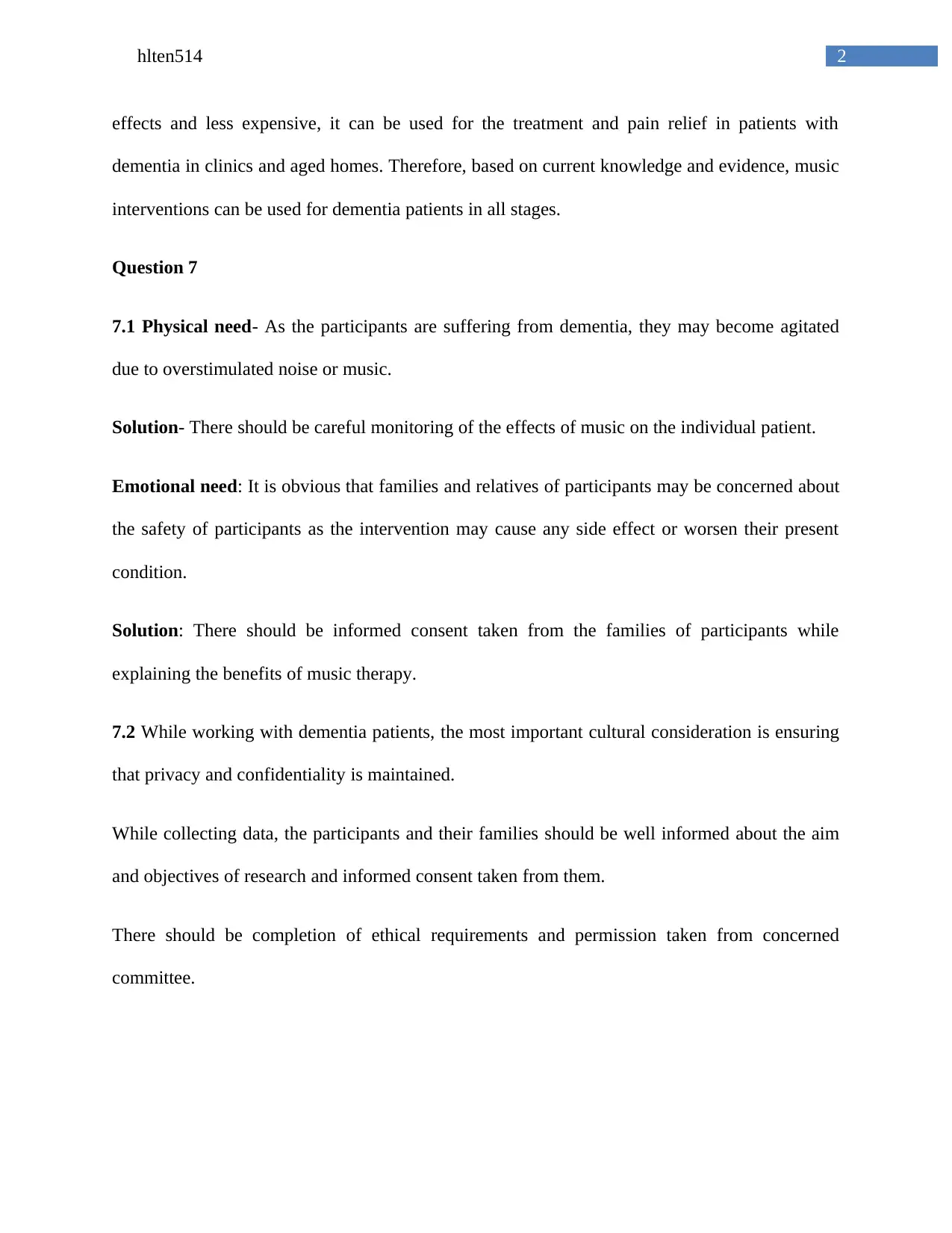
2hlten514
effects and less expensive, it can be used for the treatment and pain relief in patients with
dementia in clinics and aged homes. Therefore, based on current knowledge and evidence, music
interventions can be used for dementia patients in all stages.
Question 7
7.1 Physical need- As the participants are suffering from dementia, they may become agitated
due to overstimulated noise or music.
Solution- There should be careful monitoring of the effects of music on the individual patient.
Emotional need: It is obvious that families and relatives of participants may be concerned about
the safety of participants as the intervention may cause any side effect or worsen their present
condition.
Solution: There should be informed consent taken from the families of participants while
explaining the benefits of music therapy.
7.2 While working with dementia patients, the most important cultural consideration is ensuring
that privacy and confidentiality is maintained.
While collecting data, the participants and their families should be well informed about the aim
and objectives of research and informed consent taken from them.
There should be completion of ethical requirements and permission taken from concerned
committee.
effects and less expensive, it can be used for the treatment and pain relief in patients with
dementia in clinics and aged homes. Therefore, based on current knowledge and evidence, music
interventions can be used for dementia patients in all stages.
Question 7
7.1 Physical need- As the participants are suffering from dementia, they may become agitated
due to overstimulated noise or music.
Solution- There should be careful monitoring of the effects of music on the individual patient.
Emotional need: It is obvious that families and relatives of participants may be concerned about
the safety of participants as the intervention may cause any side effect or worsen their present
condition.
Solution: There should be informed consent taken from the families of participants while
explaining the benefits of music therapy.
7.2 While working with dementia patients, the most important cultural consideration is ensuring
that privacy and confidentiality is maintained.
While collecting data, the participants and their families should be well informed about the aim
and objectives of research and informed consent taken from them.
There should be completion of ethical requirements and permission taken from concerned
committee.
⊘ This is a preview!⊘
Do you want full access?
Subscribe today to unlock all pages.

Trusted by 1+ million students worldwide
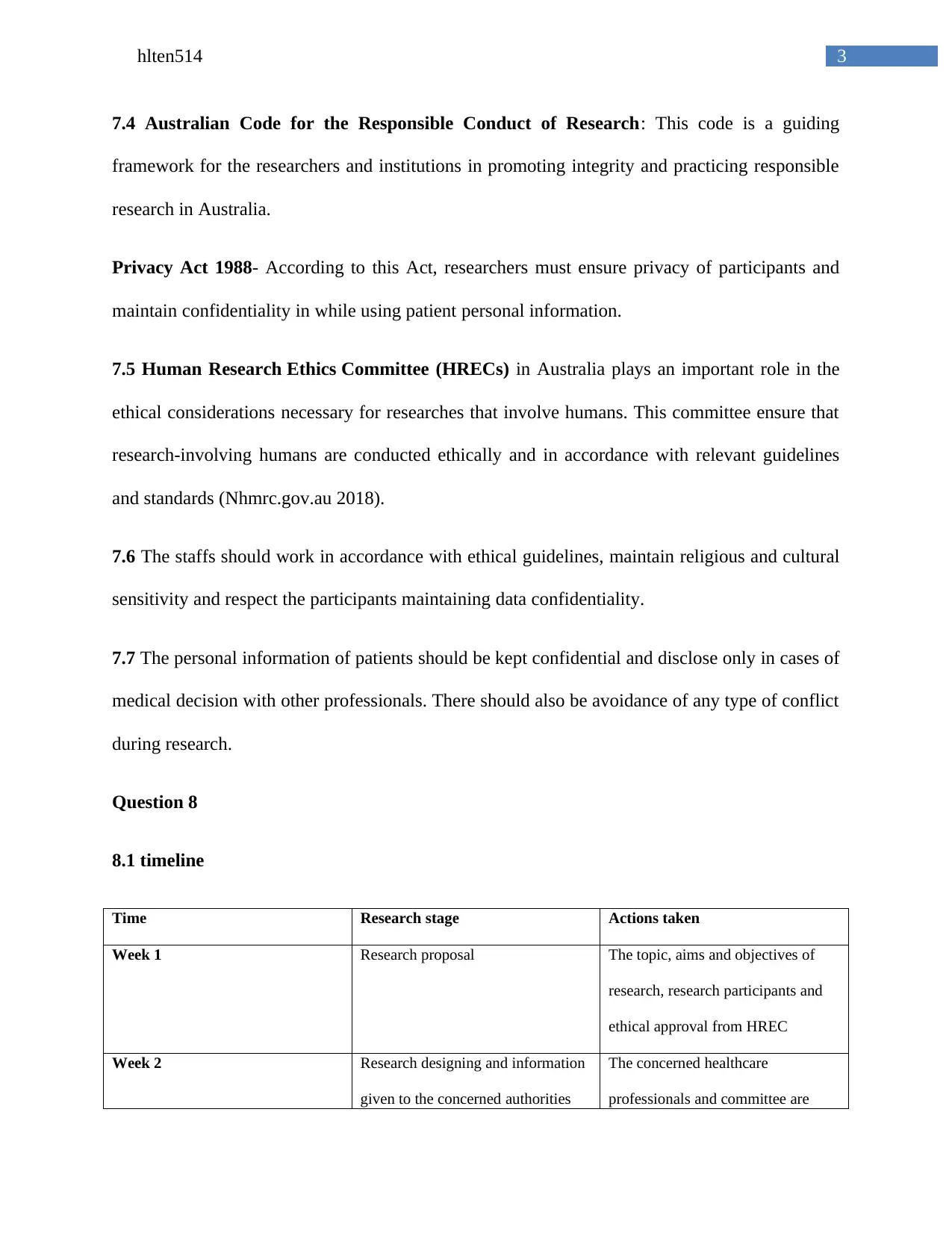
3hlten514
7.4 Australian Code for the Responsible Conduct of Research: This code is a guiding
framework for the researchers and institutions in promoting integrity and practicing responsible
research in Australia.
Privacy Act 1988- According to this Act, researchers must ensure privacy of participants and
maintain confidentiality in while using patient personal information.
7.5 Human Research Ethics Committee (HRECs) in Australia plays an important role in the
ethical considerations necessary for researches that involve humans. This committee ensure that
research-involving humans are conducted ethically and in accordance with relevant guidelines
and standards (Nhmrc.gov.au 2018).
7.6 The staffs should work in accordance with ethical guidelines, maintain religious and cultural
sensitivity and respect the participants maintaining data confidentiality.
7.7 The personal information of patients should be kept confidential and disclose only in cases of
medical decision with other professionals. There should also be avoidance of any type of conflict
during research.
Question 8
8.1 timeline
Time Research stage Actions taken
Week 1 Research proposal The topic, aims and objectives of
research, research participants and
ethical approval from HREC
Week 2 Research designing and information
given to the concerned authorities
The concerned healthcare
professionals and committee are
7.4 Australian Code for the Responsible Conduct of Research: This code is a guiding
framework for the researchers and institutions in promoting integrity and practicing responsible
research in Australia.
Privacy Act 1988- According to this Act, researchers must ensure privacy of participants and
maintain confidentiality in while using patient personal information.
7.5 Human Research Ethics Committee (HRECs) in Australia plays an important role in the
ethical considerations necessary for researches that involve humans. This committee ensure that
research-involving humans are conducted ethically and in accordance with relevant guidelines
and standards (Nhmrc.gov.au 2018).
7.6 The staffs should work in accordance with ethical guidelines, maintain religious and cultural
sensitivity and respect the participants maintaining data confidentiality.
7.7 The personal information of patients should be kept confidential and disclose only in cases of
medical decision with other professionals. There should also be avoidance of any type of conflict
during research.
Question 8
8.1 timeline
Time Research stage Actions taken
Week 1 Research proposal The topic, aims and objectives of
research, research participants and
ethical approval from HREC
Week 2 Research designing and information
given to the concerned authorities
The concerned healthcare
professionals and committee are
Paraphrase This Document
Need a fresh take? Get an instant paraphrase of this document with our AI Paraphraser
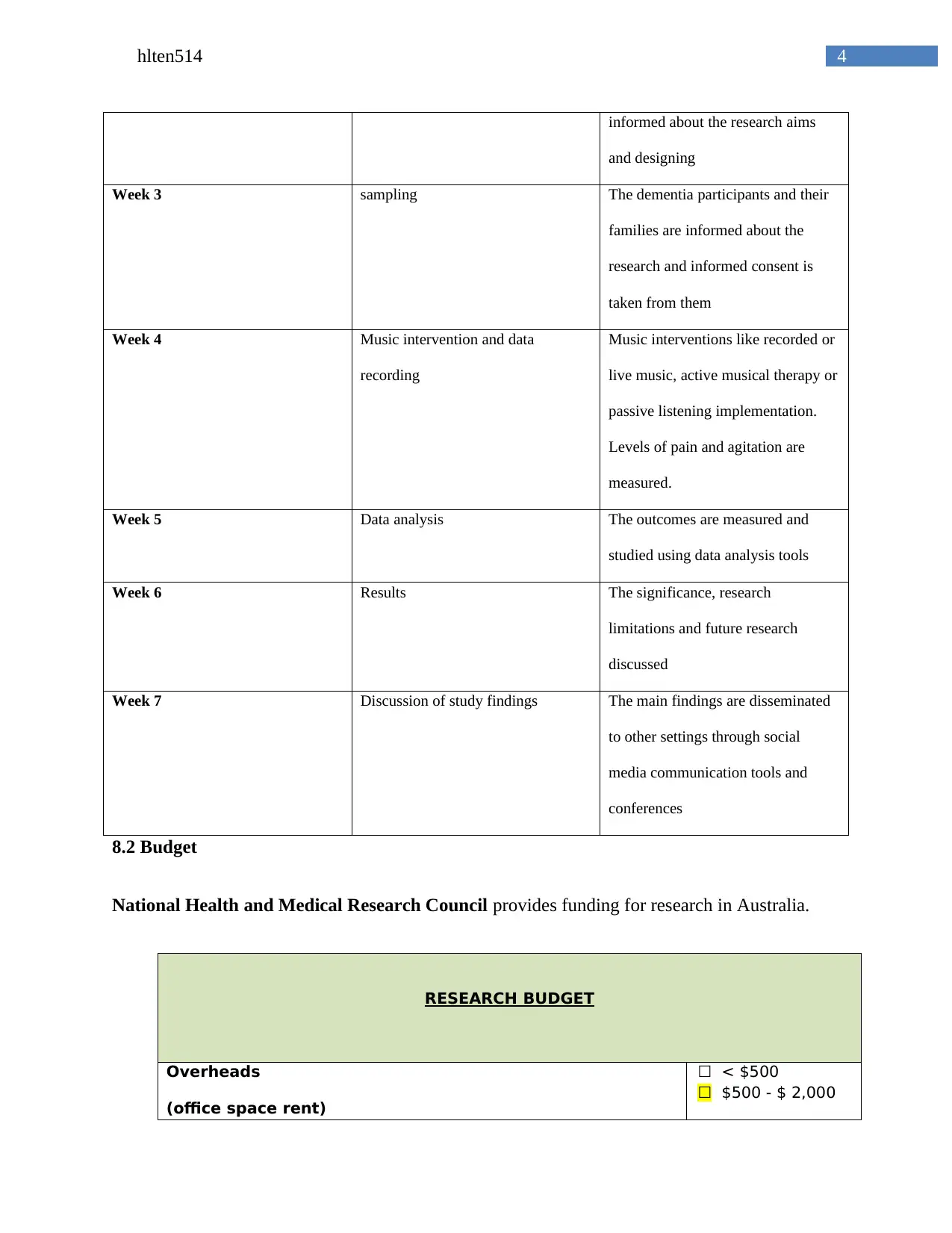
4hlten514
informed about the research aims
and designing
Week 3 sampling The dementia participants and their
families are informed about the
research and informed consent is
taken from them
Week 4 Music intervention and data
recording
Music interventions like recorded or
live music, active musical therapy or
passive listening implementation.
Levels of pain and agitation are
measured.
Week 5 Data analysis The outcomes are measured and
studied using data analysis tools
Week 6 Results The significance, research
limitations and future research
discussed
Week 7 Discussion of study findings The main findings are disseminated
to other settings through social
media communication tools and
conferences
8.2 Budget
National Health and Medical Research Council provides funding for research in Australia.
RESEARCH BUDGET
Overheads
(office space rent)
☐ < $500
☐ $500 - $ 2,000
informed about the research aims
and designing
Week 3 sampling The dementia participants and their
families are informed about the
research and informed consent is
taken from them
Week 4 Music intervention and data
recording
Music interventions like recorded or
live music, active musical therapy or
passive listening implementation.
Levels of pain and agitation are
measured.
Week 5 Data analysis The outcomes are measured and
studied using data analysis tools
Week 6 Results The significance, research
limitations and future research
discussed
Week 7 Discussion of study findings The main findings are disseminated
to other settings through social
media communication tools and
conferences
8.2 Budget
National Health and Medical Research Council provides funding for research in Australia.
RESEARCH BUDGET
Overheads
(office space rent)
☐ < $500
☐ $500 - $ 2,000
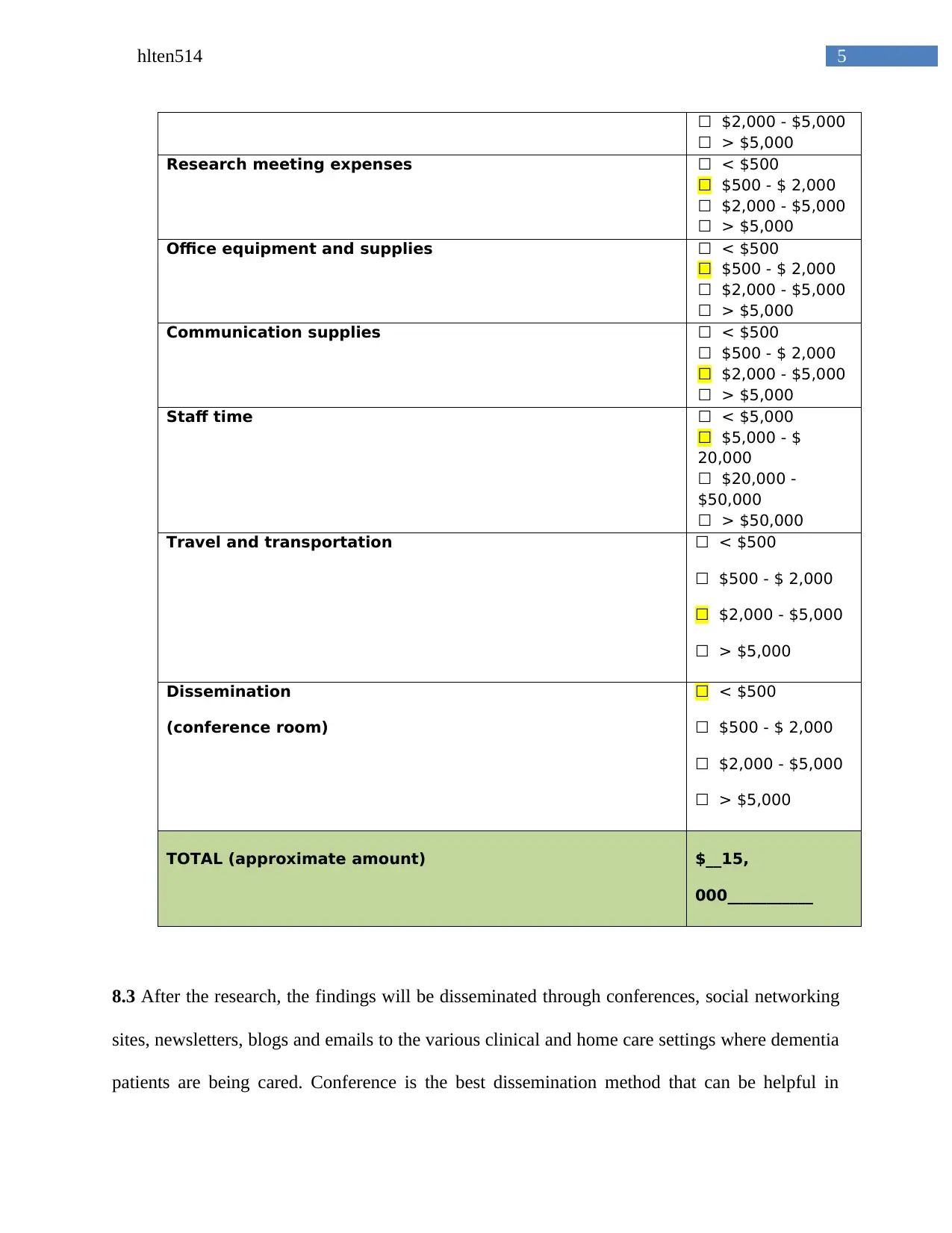
5hlten514
☐ $2,000 - $5,000
☐ > $5,000
Research meeting expenses ☐ < $500
☐ $500 - $ 2,000
☐ $2,000 - $5,000
☐ > $5,000
Office equipment and supplies ☐ < $500
☐ $500 - $ 2,000
☐ $2,000 - $5,000
☐ > $5,000
Communication supplies ☐ < $500
☐ $500 - $ 2,000
☐ $2,000 - $5,000
☐ > $5,000
Staff time ☐ < $5,000
☐ $5,000 - $
20,000
☐ $20,000 -
$50,000
☐ > $50,000
Travel and transportation ☐ < $500
☐ $500 - $ 2,000
☐ $2,000 - $5,000
☐ > $5,000
Dissemination
(conference room)
☐ < $500
☐ $500 - $ 2,000
☐ $2,000 - $5,000
☐ > $5,000
TOTAL (approximate amount) $__15,
000___________
8.3 After the research, the findings will be disseminated through conferences, social networking
sites, newsletters, blogs and emails to the various clinical and home care settings where dementia
patients are being cared. Conference is the best dissemination method that can be helpful in
☐ $2,000 - $5,000
☐ > $5,000
Research meeting expenses ☐ < $500
☐ $500 - $ 2,000
☐ $2,000 - $5,000
☐ > $5,000
Office equipment and supplies ☐ < $500
☐ $500 - $ 2,000
☐ $2,000 - $5,000
☐ > $5,000
Communication supplies ☐ < $500
☐ $500 - $ 2,000
☐ $2,000 - $5,000
☐ > $5,000
Staff time ☐ < $5,000
☐ $5,000 - $
20,000
☐ $20,000 -
$50,000
☐ > $50,000
Travel and transportation ☐ < $500
☐ $500 - $ 2,000
☐ $2,000 - $5,000
☐ > $5,000
Dissemination
(conference room)
☐ < $500
☐ $500 - $ 2,000
☐ $2,000 - $5,000
☐ > $5,000
TOTAL (approximate amount) $__15,
000___________
8.3 After the research, the findings will be disseminated through conferences, social networking
sites, newsletters, blogs and emails to the various clinical and home care settings where dementia
patients are being cared. Conference is the best dissemination method that can be helpful in
⊘ This is a preview!⊘
Do you want full access?
Subscribe today to unlock all pages.

Trusted by 1+ million students worldwide
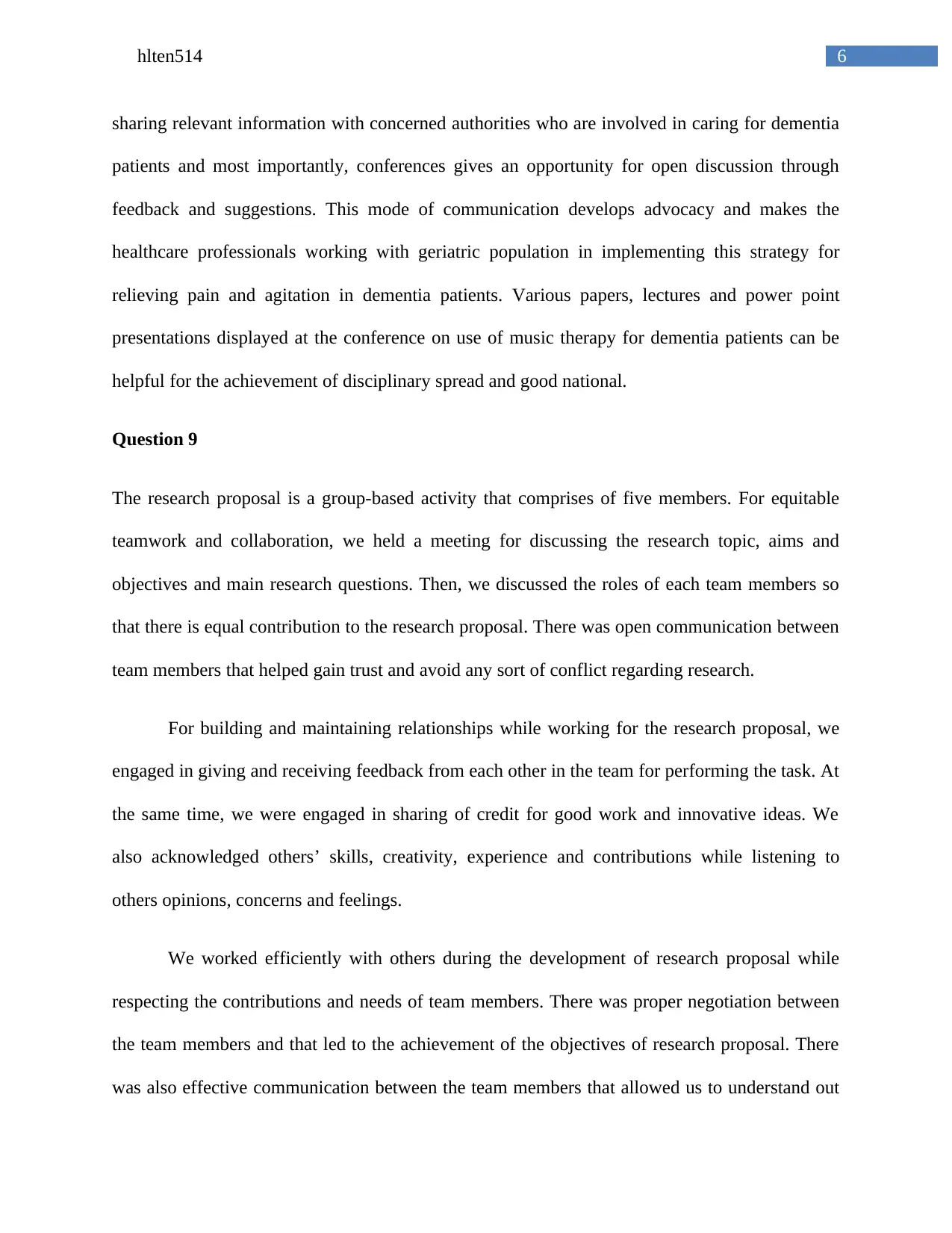
6hlten514
sharing relevant information with concerned authorities who are involved in caring for dementia
patients and most importantly, conferences gives an opportunity for open discussion through
feedback and suggestions. This mode of communication develops advocacy and makes the
healthcare professionals working with geriatric population in implementing this strategy for
relieving pain and agitation in dementia patients. Various papers, lectures and power point
presentations displayed at the conference on use of music therapy for dementia patients can be
helpful for the achievement of disciplinary spread and good national.
Question 9
The research proposal is a group-based activity that comprises of five members. For equitable
teamwork and collaboration, we held a meeting for discussing the research topic, aims and
objectives and main research questions. Then, we discussed the roles of each team members so
that there is equal contribution to the research proposal. There was open communication between
team members that helped gain trust and avoid any sort of conflict regarding research.
For building and maintaining relationships while working for the research proposal, we
engaged in giving and receiving feedback from each other in the team for performing the task. At
the same time, we were engaged in sharing of credit for good work and innovative ideas. We
also acknowledged others’ skills, creativity, experience and contributions while listening to
others opinions, concerns and feelings.
We worked efficiently with others during the development of research proposal while
respecting the contributions and needs of team members. There was proper negotiation between
the team members and that led to the achievement of the objectives of research proposal. There
was also effective communication between the team members that allowed us to understand out
sharing relevant information with concerned authorities who are involved in caring for dementia
patients and most importantly, conferences gives an opportunity for open discussion through
feedback and suggestions. This mode of communication develops advocacy and makes the
healthcare professionals working with geriatric population in implementing this strategy for
relieving pain and agitation in dementia patients. Various papers, lectures and power point
presentations displayed at the conference on use of music therapy for dementia patients can be
helpful for the achievement of disciplinary spread and good national.
Question 9
The research proposal is a group-based activity that comprises of five members. For equitable
teamwork and collaboration, we held a meeting for discussing the research topic, aims and
objectives and main research questions. Then, we discussed the roles of each team members so
that there is equal contribution to the research proposal. There was open communication between
team members that helped gain trust and avoid any sort of conflict regarding research.
For building and maintaining relationships while working for the research proposal, we
engaged in giving and receiving feedback from each other in the team for performing the task. At
the same time, we were engaged in sharing of credit for good work and innovative ideas. We
also acknowledged others’ skills, creativity, experience and contributions while listening to
others opinions, concerns and feelings.
We worked efficiently with others during the development of research proposal while
respecting the contributions and needs of team members. There was proper negotiation between
the team members and that led to the achievement of the objectives of research proposal. There
was also effective communication between the team members that allowed us to understand out
Paraphrase This Document
Need a fresh take? Get an instant paraphrase of this document with our AI Paraphraser
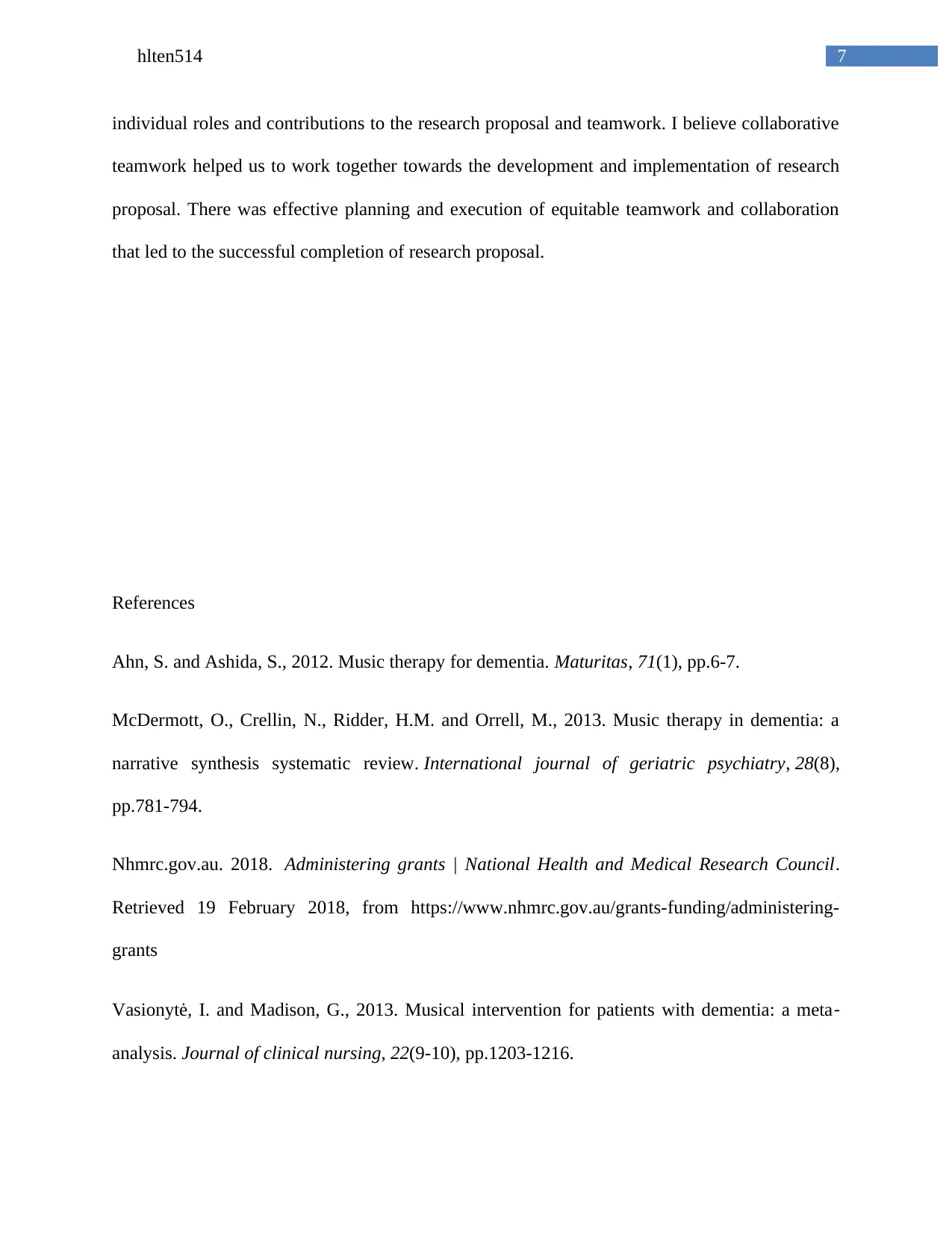
7hlten514
individual roles and contributions to the research proposal and teamwork. I believe collaborative
teamwork helped us to work together towards the development and implementation of research
proposal. There was effective planning and execution of equitable teamwork and collaboration
that led to the successful completion of research proposal.
References
Ahn, S. and Ashida, S., 2012. Music therapy for dementia. Maturitas, 71(1), pp.6-7.
McDermott, O., Crellin, N., Ridder, H.M. and Orrell, M., 2013. Music therapy in dementia: a
narrative synthesis systematic review. International journal of geriatric psychiatry, 28(8),
pp.781-794.
Nhmrc.gov.au. 2018. Administering grants | National Health and Medical Research Council.
Retrieved 19 February 2018, from https://www.nhmrc.gov.au/grants-funding/administering-
grants
Vasionytė, I. and Madison, G., 2013. Musical intervention for patients with dementia: a meta‐
analysis. Journal of clinical nursing, 22(9-10), pp.1203-1216.
individual roles and contributions to the research proposal and teamwork. I believe collaborative
teamwork helped us to work together towards the development and implementation of research
proposal. There was effective planning and execution of equitable teamwork and collaboration
that led to the successful completion of research proposal.
References
Ahn, S. and Ashida, S., 2012. Music therapy for dementia. Maturitas, 71(1), pp.6-7.
McDermott, O., Crellin, N., Ridder, H.M. and Orrell, M., 2013. Music therapy in dementia: a
narrative synthesis systematic review. International journal of geriatric psychiatry, 28(8),
pp.781-794.
Nhmrc.gov.au. 2018. Administering grants | National Health and Medical Research Council.
Retrieved 19 February 2018, from https://www.nhmrc.gov.au/grants-funding/administering-
grants
Vasionytė, I. and Madison, G., 2013. Musical intervention for patients with dementia: a meta‐
analysis. Journal of clinical nursing, 22(9-10), pp.1203-1216.
1 out of 8
Related Documents
Your All-in-One AI-Powered Toolkit for Academic Success.
+13062052269
info@desklib.com
Available 24*7 on WhatsApp / Email
![[object Object]](/_next/static/media/star-bottom.7253800d.svg)
Unlock your academic potential
Copyright © 2020–2025 A2Z Services. All Rights Reserved. Developed and managed by ZUCOL.





